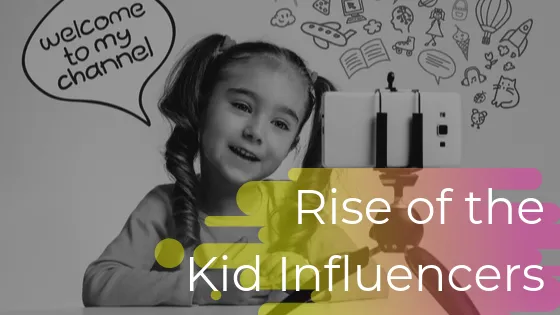The way a society treats its children is probably the best way to judge where it is heading. For every parent, their child is their world, they want to protect and shelter them from every harm in the world. But what happens when parents lose the ability to judge the threats that they are exposing their children to?
When we watch videos of children singing, dancing or just being themselves on YouTube or reels it brings a smile to our faces and probably makes our day! But these videos sometimes have a dark reality. Welcome to the world of ‘Kidfluencers’ where the children are the ones taking care of the parents (Financially). The confluence of two words, kids and influencers, has become the new sub-segment in social media that could have been avoided. The rising trend of parent-managed social media accounts is gaining immense popularity. These accounts often lead to lucrative sponsorship deals and income from advertising revenue, marking a significant shift in the world of online fame.
According to Theprint media portal, the emergence of ‘Kidfluencers’ has significantly propelled the influencer marketing industry, currently valued at Rs 900 crore, with projections indicating that it is set to grow to Rs 2,200 crore by 2025.
In an era where even adults are facing the ill effects of social media, some children have been born into the world of social media without consent. Many parents often open Instagram accounts or start vlogging as soon as they are born. But one may ask what is wrong with sharing pictures or videos of the child?
When a person grows up they make a lot of mistakes or do things that might feel embarrassing later, but we often find solace in the fact that these things will not have an effect a few years down the line. However, it’s not the same for these children who have their lives on videos to be seen by millions of people. Unwarranted criticism, hate, and degrading comments on the videos are what they are exposed to. Their life becomes content for the world to see. As they grow up they cannot shake off the embarrassment.
Anantya Anand is one of the most popular Kidfluencer who started her journey at just 5 years old, and now has a following of over 1 million on YouTube. These children today wield more power than some celebrities. Taimur Ali Khan may not have an Instagram account but his fan pages on Instagram have a huge following. It would be safe to say that he gets more attention than some of the actors in the industry!
Another kidfluencer Riva Arora (13 years old) got into a controversy for a video where she was cast in a song that was inappropriate for her age. Many criticized her parents for exposing her to such situations at a young age. There are many other ‘Daily vloggers’ who have realized that the content related to children garners high views and put their children’s lives on camera for the world to see.
Recently the news of American Vlogger Ruby Franke left people shocked as she was arrested on charges of severe child abuse. These cases reiterate the fact that there is no regulation for children who work in the field of media.
Even though there is limited data on the mental health statistics of Kidfluencers, we can judge from the fact that According to ‘Child Artists in India, An Exploratory Study in Mumbai conducted by CRY, CINTAA has encountered situations where parents have chosen to discontinue the formal education of child artists.
This decision arises from the belief that, given the early employment opportunities in the entertainment industry, the focus should primarily be on honing their artistic talents rather than their conventional education, which is traditionally seen as a pathway to future employment.
It was also noted that parents were ok when it came to allowing their children to work beyond regular hours. They were willing to have their children be available during unconventional shooting schedules and even miss school days. In many cases, these child artists serve as the primary providers for their families, which heightens their vulnerability to potential exploitation within the workplace.
While there is some regulation for children in the media industry, the same cannot be said for child influencers as they are not “working”. Their activities are not considered ‘work’ because there is no employer-employee relationship and the acts are considered day-to-day activities in front of the camera rather than ‘acting’.
France has introduced a new bill known as the ‘Exploitation of Children’s Images on Online Platforms Act.’ This legislation safeguards the earnings of children under the age of 16, ensuring that their money is protected. Additionally, it places an obligation on social media platforms to remove content upon a child’s request.
The well-being and happiness of our children should always be our foremost concern. We must ask ourselves whether these young content creators are genuinely enjoying their online presence or if they feel pressured or coerced into participating. Children may not fully grasp the consequences of sharing their lives online. We must protect their privacy and ensure they understand the implications of their actions, even when they can’t provide informed consent themselves.
It’s vital to encourage authenticity in the content children create. Rather than focusing solely on commercial success. Parents and guardians play a pivotal role in shaping a child’s online presence. They should be well-informed about the potential risks and benefits and always act in their child’s best interest.
Governments and social media platforms should consider carefully crafted regulations that protect child influencers without stifling their creativity. Let’s prioritize the mental health and well-being of child influencers, offering support and resources to help them navigate the pressures of online fame.


Recent Comments